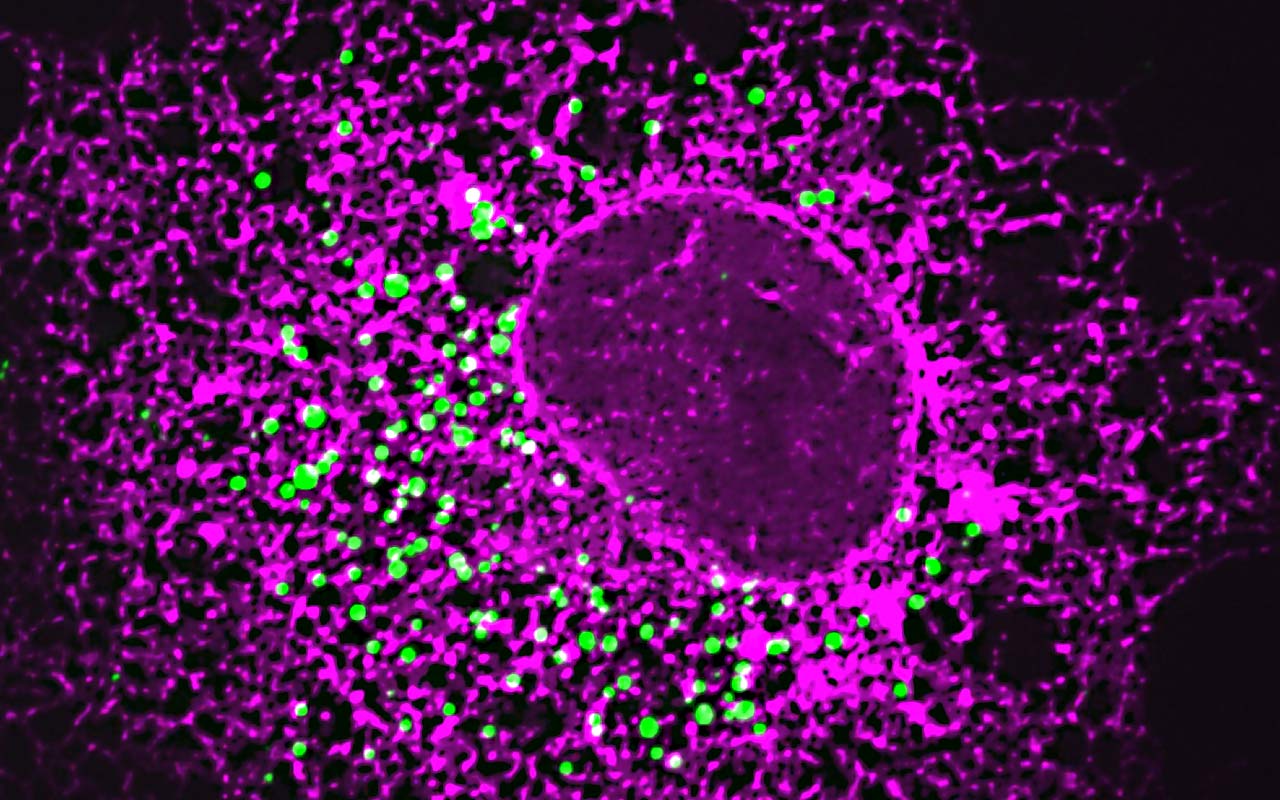
Pathological processes and signaling pathways in beta cells and their molecular elucidation
Insulin production and secretion by pancreatic beta cells is essential for human life but altered in metabolic diseases such as type 2 diabetes.
During the pathogenesis of type 2 diabetes, at least two different pathological events are involved: reduced insulin secretion by beta cells in relation to ambient blood glucose levels as well as a reduction in beta cell numbers due to beta cell death (apoptosis) or dedifferentiation. Previous studies demonstrated that several stress-associated signaling pathways involving both non-coding RNAs and proteins negatively affect insulin secretion and beta cell numbers. Several extracellular (inflammation, glucolipotoxicity) and cell autonomous (oxidative stress, ER stress, DNA damage) mediators are thought to underlie activation of these evolutionarily conserved stress signaling pathways in diabetes.
The focus of the research group is on defining and clarifying these pathological processes and signaling pathways on the molecular level.
The research group studies evolutionarily conserved, cellular stress-associated non-coding RNAs (such as microRNAs) and proteins in vitro, in and ex vivo. We examine functional alterations and interactions on the level of single proteins (i.e. post-translational modifications), the cell (i.e. transcriptome), and the whole organism (i.e. role of circulating hormones) using tools and methods from biochemistry, molecular biology, genetics and physiology. The research group is especially interested in defining and characterizing novel regulators of apoptosis involved in type 2 diabetes-associated beta cell dysfunction and loss.
Team
ERC Starting Grant „CESYDE“ 2018-2022
Pancreatic beta cell dysfunction is a hallmark of Type 2 Diabetes (T2D). Several mechanisms have been proposed that might explain how beta cells become dysfunctional. One key finding was that exposing beta cells to saturated fatty acids will eventually disturb their normal function and induce cell death. Saturated fatty acids are often contained in energy dense food, and long-term consumption of a fatty acid rich diet could be a key component of obesity and insulin resistance, and similarly, might play a role in beta cell dysfunction.
Several studies have indicated, that fatty acids are used in cells to generate complex, modified lipids, called sphingolipids. Sphingolipids are generated in cells by combining the saturated C16 fatty acid palmitate with the amino acid serine and a second fatty acid of different chain lengths. Consuming a fatty acid rich diet can lead to increased synthesis of sphingolipids. Several studies have shown that sphingolipids can play a critical role in the regulation of insulin resistance, especially in the liver. In contrast, the role of sphingolipids and ceramides in pancreatic beta cells is poorly understood as of now.
The ERC Starting Grant project “CESYDE” ultimately aims to understand how sphingolipids influence pancreatic beta cell function and survival, and which enzyme involved in sphingolipid biosynthesis could be potentially targeted for a new therapeutic approach in T2D treatment. To this end, we use biochemical, genetic and molecular tools to analyze the function of several enzymes in the sphingolipid biosynthesis pathway, define how these are regulated, which proteins interact with these enzymes, and how we can modulate these.
Contact:
Dr. Bengt-Frederik Belgardt
bengt.belgardt@ddz.de

Selected Publications
- Griess K, Rieck M, Müller N, Karsai G, Hartwig S, Pelligra A, Hardt R, Schlegel C, Kuboth J, Uhlemeyer C, Trenkamp S, Jeruschke K, Weiss J, Peifer-Weiss L, Xu W, Cames S, Yi X, Cnop M, Beller M, Stark H, Kondadi AK, Reichert AS, Markgraf D, Wammers M, Häussinger D, Kuss O, Lehr S, Eizirik D, Lickert H, Lammert E, Roden M, Winter D, Al-Hasani H, Höglinger D, Hornemann T, Brüning JC, Belgardt B-F 2023. Sphingolipid subtypes differentially control proinsulin processing and systemic glucose homeostasis. Nat Cell Biol. 25: 20–29 . https://doi.org/10.1038/s41556-022-01027-2
- Uhlemeyer C, Müller N, Rieck M, Kuboth J, Schlegel C, Grieß K, Dorweiler TF, Heiduschka S, Eckel J, Roden M, Lammert E, Stoffel M, Belgardt B-F 2023. Selective ablation of P53 in pancreatic beta cells fails to ameliorate glucose metabolism in genetic, dietary and pharmacological models of diabetes mellitus. Mol Metab. 67. https://doi.org/10.1016/j.molmet.2022.101650
- Uhlemeyer C, Müller N, Grieß K, Wessel C, Schlegel C, Kuboth J, Belgardt B-F 2020. ATM and P53 differentially regulate pancreatic beta cell survival in Ins1E cells. PLOS ONE. 15. https://doi.org/10.1371/journal.pone.0237669
- Carstensen-Kirberg M, Röhrig K, Niersmann C, Ouwens DM, Belgardt BF, Roden M, Herder C 2019. Sfrp5 increases glucose-stimulated insulin secretion in the rat pancreatic beta cell line INS-1E. PLOS ONE. 14. https://doi.org/10.1371/journal.pone.0213650
- Belgardt B-F, Jarasch A, Lammert E 2018. Exploring biological and social networks to better understand and treat diabetes mellitus: Comment on "Network science of biological systems at different scales: A review" by Gosak et al. Phys Life Rev. 24: 146-148. https://doi.org/10.1016/j.plrev.2017.12.004
- Belgardt B-F, Lammert E 2016. DYRK1A: A Promising Drug Target for Islet Transplant-Based Diabetes Therapies. Diabetes. 65: 1496-8. https://doi.org/10.2337/dbi16-0013
- Belgardt B-F, Ahmed K, Spranger M, Latreille M, Denzler R, Kondratiuk N, von Meyenn F, Villena FN, Herrmanns K, Bosco D, Kerr-Conte J, Pattou F, Rülicke T, Stoffel M 2015. The microRNA-200 family regulates pancreatic beta cell survival in type 2 diabetes. Nat Med. 21: 619-27. https://doi.org/10.1038/nm.3862
